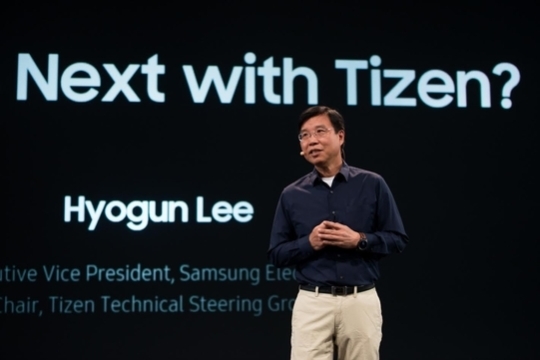Samsung Electronics unveiled Tuesday its upgraded Tizen operating system, in a move that shows the company’s ambition to take the lead in operating systems for home appliances in the Internet of Things era.
“We will expand the Tizen ecosystem into all of Samsung’s home appliances including (the) smart TV, refrigerator, washing machine, air purifier and lighting in the IoT era,” said Samsung’s Vice President Lee Hyo-gun while launching the Tizen 4.0 platform at its annual Tizen Developer Conference in San Francisco.
“We will expand the Tizen ecosystem into all of Samsung’s home appliances including (the) smart TV, refrigerator, washing machine, air purifier and lighting in the IoT era,” said Samsung’s Vice President Lee Hyo-gun while launching the Tizen 4.0 platform at its annual Tizen Developer Conference in San Francisco.

Samsung, which ambitiously launched Tizen in 2012, has failed to squeeze into the mobile sector dominated by Google’s Android and Apple’s iOS. Tizen’s market share dropped to zero in the first quarter of this year from 0.2 percent in 2015 and 0.1 percent in 2016, according to the US research firm Strategy Analytics.
Seeing little chance in the mobile OS sector, the tech giant has recently shifted the direction of Tizen development to the home appliance market where no dominant leader is present yet.
“The IoT era is completely different from the smartphone era,” Lee said citing its extensibility and openness. Tizen can be integrated with voice assistant services made by different firms, including Google, Amazon and Microsoft, apart from Samsung’s Bixby, he added.
Industry watchers said the Korean hardware giant may have an edge over internet firms like Google, Microsoft and Amazon in its operating system for home appliances.
“Samsung has (a) higher chance to take the lead in the IoT operating system, as it can directly apply Tizen into its products while other internet firms need to persuade appliance companies to add OS -- which incur extra cost,” said Seo Ki-man, a researcher at LG Economics Research Institute.
Samsung’s home appliances have around 20 percent market share in the US, taking first place in the first quarter, according to the research firm TraQline.
However, even if Samsung takes the leadership in IoT OS, it might not directly lead to profits because most consumers are not willing yet to pay extra costs for more digitalized home appliances.
“Eventually, Samsung needs to make killer services (from the IoT operating system) to make consumers willing to pay for (it). Most consumers still want to pay more for better-performing washing machines or vacuums rather than more digitalized appliances,” Seo added.
Samsung has already unveiled the Tizen-powered premium home appliances such as the Smart TV, refrigerators and washing machines with the aim of making all of its products powered by its own operating system.
By Shin Ji-hye (shinjh@heraldcorp.com)



















![[Today’s K-pop] BTS pop-up event to come to Seoul](http://res.heraldm.com/phpwas/restmb_idxmake.php?idx=642&simg=/content/image/2024/04/17/20240417050734_0.jpg&u=)